What's The Best First Episode You've Ever Seen?
It's a pretty simple question, but it can tell you a lot about someone's taste in anime: what's the single best first episode of an anime series you've ever seen? It doesn't matter if the show goes to hell afterward, we're talking simply about the single best first episode of anime you've ever seen. We polled our team of staff writers and editorial contributors – the same names you see attached to our reviews on the site every day – to find out what they thought the best first episode ever was, and more importantly, why.
What we really want, though, is to hear from you! Once you've perused our staff picks, we'd love to know what your favorite first episode is; head on over to the forums and let us know.

Lauren Orsini: Tengen Toppa Gurren Lagann
“Most of it takes place in a literal hole in the ground. We meet Simon, a protagonist whose mindset has been molded by this dark, claustrophobic environment. Then, one event after another tears open the artificial edges of his life to reveal an exciting, brightly colored world where the rest of the series will unfold. In this way, episode one is a microcosm of the rest of the series, which shatters our preconceptions with one extraordinary event followed by another, all on an increasingly dilating scale. We are all Simon, and our narrow idea of what's possible is repeatedly reestablished.
Of course, this is what you'll learn after the fact. The episode is entertaining by itself because Gurren Lagann's writers are masters of the quick study. It doesn't take more than half an hour to feel like we know Simon, or for that matter, Kamina or Yoko, and somehow this knowledge doesn't make them feel flat; rather, it compels us to get to know them better. It's established right away how much each of these characters need one another. Simon needs Kamina, who is a troublemaker eccentric enough to break through isolated Simon's thick emotional armor. Kamina, who dreams of one day going to the surface world, needs Yoko in order to get there. The actions they take toward pursuing these interests—and there is certainly a lot of action in this episode—serve as their character studies while rapidly progressing the plot.
Finally, Gurren Lagann's first episode looks and sounds great. Bold colors combined with exaggerated perspective render the subterranean world in high contrast, while an epic soundtrack adds purpose to this stylized world, giving the impression of something greater bubbling just below the surface. Of course, plot wise, it turns out to be something rumbling just above the ceiling. When Gurren Lagann intricately creates a world and smashes it into bits by the second half of the episode, viewers may start to suspect that Kamina's assurance that Simon will be the one to “pierce the heavens with [his] drill” isn't just a metaphor. It's a pilot that sells itself expertly, and one I've found myself watching again and again.

Amy McNulty: Please Save My Earth
A teenage babysitter slaps a bratty young boy across the face when he's perched precariously on an apartment balcony rail. The boy plummets to what seems like certain doom. It sounds like something out of a Dateline true crime special, but with the teenage girl admitting she instinctively understands the feelings of animals and even plants, you know there's more to the story. It only took one episode of the six-episode early ‘90s OVA Please Save My Earth to get me hooked, but the story soon developed into something far heavier and more compelling than what I initially imagined. This romance-heavy tale of “ordinary” high school students is laden with sci-fi and fantasy themes like ESP, alien scientists, reincarnation, and betrayal.
Timid sixteen-year-old Alice Sakaguchi is tormented by her seven-year-old neighbor Rin Kobayashi. He'll do anything to get her attention, like spit gum in her mouth or drop a plant bulb she loves over the balcony in retaliation for Alice mentioning she might have feelings for a boy at school. Rin's fixation on Alice is unsettling because something seems “off” about the kid. His crush on a girl nine years his senior is regarded with amusement by some characters and revulsion by others—and it's just too serious. When Rin survives the fall, the change in him is subtle but evident enough for the audience to see. He now seems to be driven by a darker purpose, although his obsession with Alice remains stronger than ever—despite the fact that she was responsible for his injuries. Fully aware of Alice's intense desire to make amends, Rin doesn't hesitate to use her guilt to his advantage.
By the time the credits roll, viewers are dying to learn more about the space travelers a stress-riddled Alice dreamt about following the accident. You want to know how Rin can suddenly fly—and why he's using his newfound powers to terrorize the punk son of a construction company owner. There's a disturbing feeling that permeates the entire episode and eventually culminates in a dark revelation. However, there's still enough hope to be found in Alice's connection to her classmates, who believe they're the reincarnated space travelers from her dream, to make you think good might win out in the end.
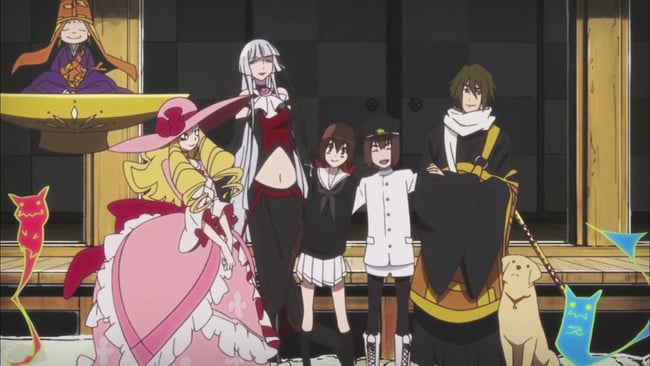
Nick Creamer: Kyousogiga
There are a couple really obvious directions I could go with this one, from indisputable classics everyone's seen. FLCL has a wonderful first episode; so does Cowboy Bebop, and so does Neon Genesis Evangelion. But those shows have no shortage of evangelists, and so I'm going to go with something a little less universally known - Kyousogiga.
Kyousogiga's first episode introduces us to the strange monk Myoe, whose drawings apparently come to life. Myoe is secretly adored by one of his creations (a rabbit), but Myoe is a lazy and unobservant god, and so it takes a bodhisattva granting that rabbit a human form for him to realize he is loved. The love story of Myoe and the rabbit Koto takes up maybe three brief, endearing scenes, and then we meet the couples’ three children, who all have their own magical eccentricities. But the strange lifestyle of Myoe and his family frightens the mundane humans of their village, and so eventually the whole family retreats into one of Myoe's drawings, seeking shelter in a strange alternate Kyoto full of indescribable creatures, where nothing ever changes, and where the three children eventually end up languishing as guardians waiting for their parents’ return.
Kyousogiga's first episode is all kinds of busy and runs through a whole bunch of plot, but the whole thing ends up coming off as naturally paced, endearing, and brimming with creativity. The show was Rie Matsumoto's first series as director (after directing one of the Pretty Cure movies), and all the visual and storytelling genius she'd later apply to Blood Blockade Battlefront are clear here too, in a project that was clearly a labor of love. The story is told through a combination of playful narration, interviews with the local villagers, and intimate scenes with the family; Myoe, Koto, and their three children all end up feeling like real people despite only getting a few scenes apiece. And when the episode shifts to Mirror Kyoto after Myoe and Koto have disappeared, the tone shifts too, adopting a sadness and malaise that's perfectly suited to the feelings of the abandoned but full-grown children. The interpersonal banter is strong, the visual framing is gorgeous, and the mix emotions of the characters comes through even as the episode also works to establish an entire new world. Kyousogiga's first episode is funny and clever and melancholy and warm, a tremendous opening to one of the best shows in recent years.

Mike Toole: Science Ninja Team Gatchaman
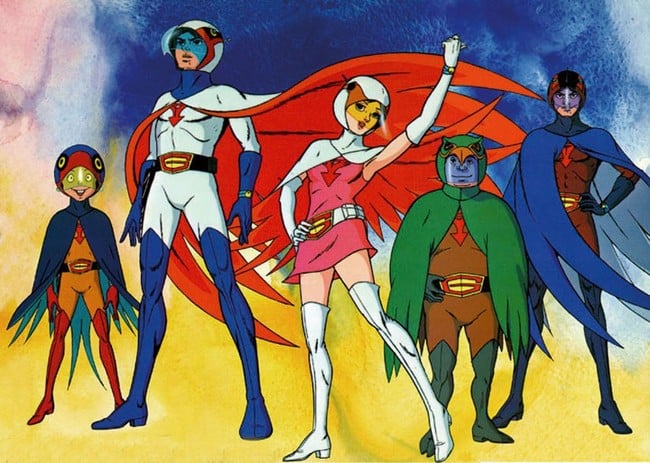
A titanic shape emerges from the sea and promptly annihilates a military watchtower. The army, quick to respond, pours wave after wave of ordinance on the mechanical monstrosity, to no effect. It tears a vault open like tissue paper, squashes the scientists inside, and makes off with the contents. Smash cut to a high-tech conference room, where the greatest scientific minds in the free world discuss the crisis. "The uranium that we wanted to use for world peace has been stolen by the monster robot!" exclaims one of the luminaries. Fortunately, Dr. Nambu of the International Science Organization has organized a team to deal with the threat-- a science ninja team, no less!
One of these science ninjas is a handsome young man, flying a Cessna. On Nambu's command, he hollers "Bird, go!" into his watch, and via an eye-popping optical effect, transforms into a white-clad superhero in a high-tech jet. He's joined by four color-coded companions in awesome vehicles. Dr. Nambu briefs them. "Science ninja team... I pray for your success!" he concludes, and Bob Sakuma's spastic, brassy soundtrack, replete with organ freakouts that would sound right at home on any 70s Emerson Lake and Palmer LP, kicks into overdrive. It goes without saying that the science ninja team Gatchaman will confront the bad guys and murder them in style, using a dizzying array of deadly and hilariously improbable attacks. Ippei Kuri's genre-defining superheroes get off to a roaring start in their first episode, only briefly confronting the commander of the mysterious Galactor organization, Berg Katse, before circumstances force them to make a last-ditch effort to defeat the giant robot-- an effort that involves taking their state of the art plane and setting it on fire.
Science Ninja Team Gatchaman set the stage for superhero and action cartoons around the world for the 1970s and beyond-- its influence is still felt today, in everything from Power Rangers to Sailor Moon to its own distant spinoff, Gatchaman CROWDS. (This first episode makes a great companion to CROWDS' similarly pulsating opening episode.) Every second, from the opening moments to the ending credits, featuring Masato Shimon's incredibly catchy, chart-topping Gatchaman theme song, is pure entertainment. I first saw this episode, in bowdlerized form as Battle of the Planets, when I was five or six years old. Thirty years later, I'm every bit as entertained as I was then. The show isn't just a rip-roaring superhero story, it's packed with wildly experimental animation, sweeping pans and rotations that don't always look good, but are always exhilarating to watch. On blu-ray, with a relatively recent, faithful dubbed version, the show exudes magic. Gatchaman was made for starry-eyed kids, but anyone can enjoy this classic.

Theron Martin: Cross Game
On average, about one show per season wows me enough with an exceptional first episode to get me enthusiastic about it even if I wasn't originally intending to watch it. Over the years a handful of these first episodes have had enduring impact and prominence for me, among them Scrapped Princess, Le Chevalier d'Eon, Koi Kaze, Kurau Phantom Memory, and Attack on Titan. One clearly stands above all of the others, though, as it is the one which most utterly caught me off guard: the first episode of Cross Game.
At the time this series debuted (the Spring 2009 season), I was completely unfamiliar with the other works of creator Mitsuru Adachi, so all I knew going in is that this would be a baseball-themed series.
Hence I had zero expectations – in fact, probably even negative ones, since I normally can't stand sports anime. That its initial scenes also made it look like it would be a kid-focused anime also left me wary. It soon showed surprisingly high narrative quality for a seemingly-simple story about elementary school boy Kou, baseball, and his girlfriend Wakaba, though, and as that began to work its magic I started to get drawn in. Wakaba was a huge part of that, too; she was a wonderfully dynamic character, the kind whose force of personality wasn't heavy-handed (a la Haruhi Suzumiya) and yet irresistible to everyone, even seeming antagonist boy Akaishi. She was the kind of character who could influence the course of the entire series even if she wasn't the lead. And that's exactly what ended up happening, though in a way I never would have expected. That was because, before the first episode had ended, the story turned everything on its head with an untimely death: Wakaba's, in an off-screen swimming accident.
Such a stunning turn of events could have easily been mishandled or over-dramatized, but the grace and emotional impact with which director Osamu Sekita managed it was masterful. The final four minutes of the episode still are highly cathartic for me even on repeat viewings, but when I originally saw it the moment which irrevocably locked me in to watching the series was how Kou didn't understand how to handle the emotion he was feeling until he saw Akaishi crying. A wonderfully poignant song (which was just an extended version of the series’ initial closer) played throughout, flawlessly setting the mood and perfectly seguing into the closer visuals, which put a sentimental wrap on things and set up where the series would go next: continuing the story a few years later, with Wakaba's presence ever-lingering.
Back when I first did a Preview Guide write-up for the episode, I proclaimed it as one of those episodes which makes sifting through all of the dreck out there worth it. I still hold to that to this day.
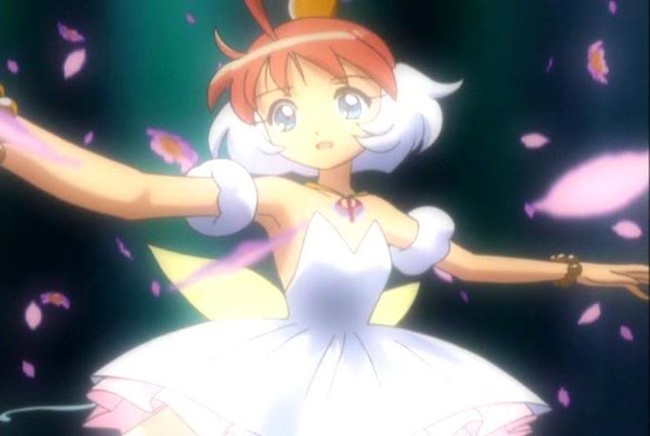
Rebecca Silverman: Princess Tutu
One of the fastest ways to get my brain to launch into overdrive is to ask me what my favorite anything is. It's especially bad with books and/or authors, but anime is a close second, so I cycled through roughly forty choices before ultimately coming to a conclusion. I'm still not positive that it's the best, but it certainly holds a record for “first episode I've watched the most,” so there's definitely something to be said for the opening episode of Princess Tutu.
When I first watched Princess Tutu, I felt like the show had been put together from everything I love: folklore, magical girls, ballet, and an element of creepy mystery. The narration, relayed in a sing-song elderly voice, brought the show back to the roots of storytelling, and the strange, enclosed world of the tale took all of the more carnivalesque elements, such as a giant cat as a teacher or the presence of E.T.A. Hoffman's Herr Drosselmeyer, pulled from his place in The Nutcracker but retaining the essence of his creepy clockmaker character. Heroine Duck (although I admit that I always think of her as Ahiru, since it sounds more like a “name” to me) was both relatable to my younger self and fit the requirements for a magical girl: an aspiring ballerina caught up in a strange world she doesn't quite get, she nonetheless tries her hardest, not just to do what she has to, but also to understand and befriend those around her. And then there was the music: Tchaikovsky's score is evocative, even if you've never seen the ballet, as is all ballet music, but if you do know the shows the songs come from, seeing the dances reinterpreted via a different storytelling method is nothing short of fascinating.
It was this combination of my own personal tastes and the use of established narrative methods that sold me on the show, and that it continued to be wonderful as the series went on was the icing on the cake. Rewatching it now I can also appreciate the animation and the color palette, both of which also help to make this a stand-out, but at the end of the day, it's the story and the characters that I personally care about the most. Duck, Rue, Mytho, and Fakir, to say nothing of Herr Drosselmeyer, stick with me, as does the episode that started their journey.

Paul Jensen: Death Parade
“The first episode of Death Parade stands out in my memory as a great introduction to the series, but it's also impressive as a stand-alone piece of storytelling. The episode begins with two people walking into a bar and ends with both of them leaving; you could theoretically stop watching the series there and still walk away with a sense of closure. The show certainly provides enough entertainment along the way, courtesy of some sharp plot twists and raw emotions wrapped around a game of darts. We may not know anything about Decim or his two guests going in, but the high-stakes game brings Takashi and Machiko's personalities out into the open in a hurry.
Presentation also plays a big role in making the episode work as well as it does, especially since the series needs to introduce a fairly unusual world and premise. The animation direction, music, and background art all work together to create an experience that's both immersive and unsettling, and Decim's stone-faced description of the situation makes it all the more horrifying for his two guests. For all the eerie intensity, there's also a sense of showmanship, perhaps even fun, hovering in the background. From the energetic opening theme to the explosive presentation of the dartboards, there are plenty of interesting quirks that paint the series as more than just a psychological thrill ride. The first time I watched this episode, I found myself excited by the prospect of having no idea what to expect from the rest of the series.
The eager anticipation that I felt was due in part to the relative lack of standard anime plot devices in the episode. There's no ambitious teenage protagonist, no long-winded explanation of a complex system of magic, no cute girls drinking tea, and no giant robot hidden away in a secret base. There's plenty of fun to be had in a good genre show, but that feeling of “something different” is rare enough that it set off all kinds of celebratory lights and sirens in my head. When you watch a large amount of anime over a long period of time, it's the shows that defy easy categorization that tend to stand out the most. Death Parade begins by promising to try something new, and that's as good a reason as any to give a series a chance.”
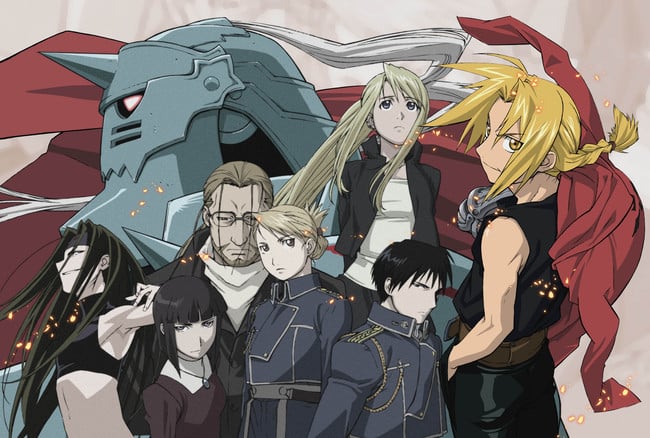
Rose Bridges: Fullmetal Alchemist
"This was difficult for me, because many of my favorite anime are shows like Utena, Princess Tutu and Fate/Zero that took a while to really grab my attention the first time around. On re-watch, I can see that Utena's first episode is pretty special, but a lot of what makes it that way doesn't capture your attention until you can pick up on all the subtext and foreshadowing. A first episode should make the viewer chomping at the bit to watch more. I do think it matters for me if the series as a whole is good; I think first episodes should be a taste of things to come, not the whole event. Starting off strong and losing steam is far too common in anime these days. Plus, when the rest of the show is good, it can build on that opener in surprising, fascinating ways.
It's probably completely unsurprising coming from me, but one of my favorite first-episodes is the two-part opener to Fullmetal Alchemist. It plunks you right down into the action, within what could have been a self-contained adventure. It slowly lets you into the details of this world, as your investment in its builds, and foreshadows many of the thematic ideas that show up later in the series: religion, sacrifice, and the problems when one culture tries to solve another's problems without understanding it. The best thing is that FMA could have left this completely alone, like it did other episodic adventures that followed it. Instead, it was a pivotal turning point in Ed and Al's journey with consequences that reverberate throughout the storyline. FMA's a great example of how to pull viewers into your story at their own pace, and pay that investment off down the line.
On the other end of the coin, among more standard 'introduction' episodes, I really love the opening to Ouran High School Host Club. It takes time to introduce every main character, but also shows off a lot of the show's unique humor and symbolism. In that respect, it distances itself from its source manga straight-away, with the quirky symbolism Yoji Enokido brought in from Utena (like the flashing lightbulbs). The other thing about Ouran's intro is you know immediately whether its style of humor will work for you or not. That's an essential with comedy anime: since humor is one of the most subjective things in fiction, it's good to let viewers know if it's worth the investment right away. Even with its excellent dramatic moments, it's hard to enjoy a show like Ouran if it isn't making you laugh when it's supposed to be."
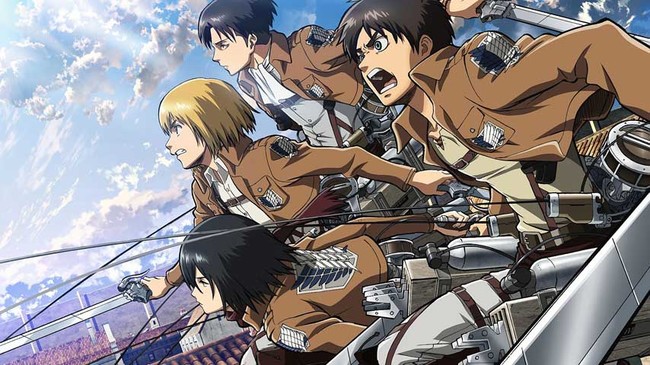
Hope Chapman: Attack on Titan
I think certain anime directors are better at creating strong first impressions than others, regardless of what material they're working with, and Tetsuro Araki is definitely in that group. Since I like intense beginnings, sometimes even if the show ends up being more slice-of-life later, I appreciate Araki's desire to put an enormous foot forward in all his first episodes. So on the note of enormous feet, I gotta go with Attack on Titan.
The first couple seconds are unexpectedly powerful. We see birds passively drifting to freedom mere yards away from a colossal skinless hand atop an impossibly high wall. The trapped people underneath look up in horror as the muscular fingers squeeze and crumple the stone like paper. In a broken voice, the narrator informs us that this is the beginning of the end for humanity as anything more than livestock. It makes us want to sit up and pay attention to this quaint little European village, which is good, because the Titans aren't going to come busting through until 3/4 of the way through the following episode.
Until then, it's all character-building and quiet foreboding that all hits much harder than it would without that gripping opening scene. Now the audience knows that the Titans are going to tear down that wall soon, so we feel for the protagonist Eren yelling at everyone to stop being so complacent. Sure, he's a pain in the ass to his friends and family, but he's also right about the city's ignorance to the danger. He is just a stubborn kid though, so we sympathize with his mother and Mikasa too. Mouthing off to strangers is probably going to get Eren killed before the Titans even show up. (And when they do show up, Eren's reaction betrays that he obviously didn't understand how dangerous they really were.) Then there's Armin, who's able to take a stance apart from these two perspectives and give us an idea of how the world got this way and why people do or don't fear the Titans. It's a ton of information delivered through natural conflicts of personality and extraordinary circumstances. We were intrigued because we knew this world was doomed, but now we have a reason to care about its fate too.
Then the Titans bust in and cement their status as unforgettable monsters: not quite giants, not quite zombies, but some unholy mix of animal and human meant to give us waking nightmares. People don't die quickly to these horrors, and Eren's mother is no exception. The choice to show the (multiple) struggles to free her, the slow advance of her killer, and even her fear and regret at choosing to be left behind in her last moments, are all sharp and haunting decisions that burn images onto our brains. We're not just told that Eren snaps and swears revenge, we feel it, and that's what makes this a great first episode.
discuss this in the forum (166 posts) |